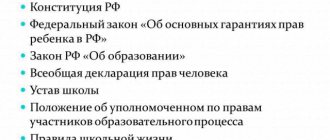List of rights
Adolescence is considered the period from 14 to 18 years. Having reached fourteen, a citizen receives a large amount of rights. However, their full implementation is still limited to legal representatives. Let's look at the basic rights of teenagers:
- personal;
- property;
- housing;
- for education;
- for labor;
- to protect rights.
This list represents the basic rights that adolescents are entitled to upon reaching a certain age. From the age of 14, new opportunities are added to minors every year.
Personal
The Family Code assigns the child the right to a name. However, initially it is simply an opportunity to have personal data. Only upon reaching the age of ten is consent required to change the name of a minor. And from the age of 14, a minor can change his data independently, taking into account the opinion of his legal representative.
The right to be raised in a family also belongs to citizens from birth. Once they reach 10 years of age, they can decide which parent to live with if they live separately. A teenager left without care must give consent to his family placement. The candidate for guardianship first establishes contact and builds a trusting relationship with him.
The opinion of the minor will also be clarified in other matters directly related to him. In particular, these include deprivation of parents' rights and their restoration.
Property
From the moment of birth, a child has the right to own any things not prohibited by law. The fourteenth anniversary marks a new stage in the property rights of a minor. Now he can dispose of property with the consent of his legal representative.
Important! When reducing a teenager's property, in addition to the decision of the parents, permission from the guardianship authority is required.
The law establishes the rights of a child at the age of 14 in Russia, which children can exercise independently. They are added to transactions permitted for minors. Among them:
- spending your salary and stipend;
- management of funds located in bank accounts opened by a teenager;
- the opportunity to have copyrights and receive income from them.
A minor may purchase food, clothing, art supplies and other items for personal use. In addition, the teenager has the opportunity to donate property with the consent of the guardian.
Housing
A teenager has the right to live in an apartment that belongs to his parents on the right of ownership, under a lease agreement or free provision. When a child turns fourteen years old, he can live separately from his mother and father, for example, with his grandmother or other relatives.
Important! A minor raised in a foster family (guardianship, foster) can live separately from his legal representative from the age of 16 on the basis of an appropriate order from the guardianship authority.
A teenager can not only own living space, but also participate in the process of disposing of property. For example, for sale (with the consent of the guardian) or for rent on your own behalf.
If a transaction worsens the housing rights of a minor, permission from the municipal guardianship authority is required to carry it out. To obtain it, you need a personal statement from the teenager.
For education
The legislation of the Russian Federation gives teenagers the right to receive free education. The student can participate in choosing the type of education and the language in which it is conducted. At the same time, the opinion of parents in this matter should not be decisive.
Although education is the right of the minor, the legal guardian has the responsibility to provide space for learning. Otherwise, punitive measures provided for by the legislation of the Russian Federation will be taken against them.
To work
Minors can carry out labor activities. At the same time, the workload and length of the working day must correspond to the age of the teenager. Let's take a closer look:
- 14 years old - concluding an employment contract to carry out light activities that are not harmful to health, with the consent of the legal representative and the municipal guardianship department.
- 15 years – conclusion of an employment contract by a child who has received basic general education (9 grades) to carry out light activities that are not harmful to health, at his own discretion.
- 16 years old – conclusion of an employment contract by a teenager who is a citizen of the Russian Federation, without taking into account the opinion of his parents.
If a minor is receiving education, he may be employed only outside of school hours and without prejudice to his studies. It is prohibited to use teenagers for harmful and strenuous activities.
Important! The child’s performance of activities under an employment contract is the basis for recognizing him as fully capable until he reaches the age of eighteen, that is, the ability to independently perform duties and exercise rights. To do this, you must contact local authorities with the consent of your parents.
To protect rights
Protection of rights is an integral part of civil capacity. The ability of a teenager to independently apply to specialized authorities for the protection of violated interests arises from the age of 14.
Currently, such a preventive method of protecting children from domestic violence as “hotlines” has become widespread. A teenager can call a specialist around the clock to request protection.
The most common reason a child seeks help is abuse by a legal representative. In this case, a minor can apply not only to the municipal guardianship department or the prosecutor's office, but also to court on his own behalf.
Metastases in the brain of children: They want to infect the country with a new Cancer
After the transfer of the Commissioner for Children's Rights of Russia, Anna Kuznetsova, to the State Duma, a number of contenders for this position appeared. One of the favorites of this race is Natalia Agre. A successful restaurateur, and at the same time an expert on traffic rules, she urgently took care of children - she became the director of the state Institute for the Study of Childhood, Family and Education. Agra structures receive multimillion-dollar government contracts through the traffic police, but it seems that just money is not enough for her - she also wants influence, and influence on our future.
Tsargrad decided to study the biography and activities of the successful businesswoman Natalya Agre and was very surprised by two things: firstly, why did she need this, and secondly, how can such a fundamental direction be entrusted to a person who, in fact, has nothing required by law experience in protecting children's rights, nor legal education.
that Children's Ombudsman Anna Kuznetsova would leave her post appeared even before the start of the election campaign for the State Duma of the eighth convocation - more than a year ago.
But then, last fall, when preliminary lists of future candidates for State Duma deputies were being formed, few could predict Kuznetsova’s possible successors as Commissioner for Children’s Rights.
But in vain.
As Tsargrad found out, there were people who calculated the options and scenarios many months in advance, and began preparing their candidate.
“Impeccable reputation and work experience”
The procedure for appointing a children's ombudsman is particularly ingenious, at first glance, no different from the determination of the heads of many other areas: this is the prerogative of the head of state, since, in fact, the position is “Ombudsman for Children’s Rights under the President of Russia.”
There are no open competitions. The main thing is to meet the criteria outlined in the federal law of December 27, 2018 No. 501-FZ “On Ombudsmen for Children’s Rights in the Russian Federation”, where Article 4 (Requirements for the Ombudsman) contains four points:
- A citizen of the Russian Federation who is at least thirty years old, has an impeccable reputation, has a higher education and experience in implementing and protecting the rights and legitimate interests of children, restoring violated rights and legitimate interests of children, or experience in human rights activities can be appointed as an authorized representative .
- The authorized person cannot be a member of the Federation Council of the Federal Assembly of the Russian Federation, a deputy of the State Duma of the Federal Assembly of the Russian Federation, a deputy of the legislative (representative) body of state power of a constituent entity of the Russian Federation, a member of a political party or other public association pursuing political goals, or engage in other paid activities , for with the exception of teaching, scientific and other creative activities.
- The Commissioner is subject to the requirements, restrictions and prohibitions established by Federal Law No. 273-FZ of December 25, 2008 “On Combating Corruption” in relation to persons holding public positions in the Russian Federation.
- The authorized person is obliged to cease activities incompatible with his status within fourteen days from the date of appointment to the position.”
All.
However, it is clear that Vladimir Putin does not look for candidates himself, looks through resumes, and correlates their data with the requirements. Moreover, those people who put on his table a certain shortlist with the names of potential figures also receive options from their assistant advisors, after which, of course, they clean and check the list for compliance, cutting off the “unnecessary ones.”
So, in order to get at least to the preliminary stage, you need to at least appear in the media space, give comments in the media, lead some kind of big “sounding” project, head a significant organization, have status, reputation. In general, the portrait must fit within the framework of the public idea of a children's ombudsman.
Whoever is in the ombudsman's chair, stand in a row!
And now, when Anna Kuznetsova has been officially relieved of her duties as commissioner, the struggle for “her” chair is unfolding – unnoticed by the uninitiated.
The names of potential contenders appeared in the media as if by chance, despite the fact that, let us make a reservation once again, there is no competition in principle.
Nevertheless, insiders name specific names.
Among them is the heroine (with the prefix “anti-“) of the Tsargrad investigations, ex-Ombudsman for Children’s Rights in the Moscow Region Oksana Pushkina , a well-known lobbyist for Western family standards, who did not get a place in the new State Duma, president of the Volunteers to Help Orphans charity foundation » Elena Alshanskaya, lawyer Ekaterina Gordon , children's ombudsman for Moscow Olga Yaroslavskaya, Deputy Minister of Health of Russia Oleg Salagai, as well as “social entrepreneur” Natalya Agre.
Moreover, the last two are positioned as “the favorites of the race” - supposedly there, “at the top”, they are currently choosing from them, listening to the arguments of those who promote candidates (and again, conditional candidates), in order to then offer them to Putin himself for choice.
Sources from Constantinople, however, believe that Salagai here is rather a figure to distract attention, whose surname is simply used for “weight”, taking into account his status, since he does not even nominally fit into the above criteria.
But lately a lot has been said about Natalia Agre – and in different variations. Some even claim that the issue is a settled matter. And yet, I don’t want to believe in this, even remembering the activities of, to put it mildly, without some praise, Anna Kuznetsova.
The University of Malta and the project winning multimillion-dollar government contracts
Until now, however, the general public, as they say, knew very little about Agra.
She is 43 years old, she is a native Muscovite. According to the original version of the biography, she received her first diploma in 1997 abroad - at the University of Malta with a degree in commerce (bachelor), but in subsequent official versions there is no mention of this fact - on the other hand, there were no refutations to it either. The strange diploma at the age of 19 is very reminiscent of the mysterious higher education of another beauty and nominee, Marina Rakova, who is now facing serious charges of embezzlement.
The website of the Institute for the Study of Childhood, Family and Education of the Russian Academy of Education (about this period - a little later) indicates that in 2005 Natalya Agre graduated from the Moscow Institute of Public Utilities and Construction with a degree in Commerce and is “currently undergoing postgraduate studies RANEPA with a degree in Sociological Sciences.
She worked in the field of advertising and marketing for about ten years, and at the end of the 2000s she took up her own projects: she opened the advertising agency “Pifopi” (which, by the way, showed good revenue from the very beginning - in the peak years of 2018-2019 up to over 120 million per year) and founded the expert, becoming its president.
By the way, there is also an LLC (limited liability company) with a similar name - “Movement Without Danger” (DBO), registered in 2009 with an authorized capital of 10 thousand rubles. That is: the shell is for the public, since everyone sees the vigorous activity, and the inside is for the pocket. Moreover, even on the website of what is called an “expert communications agency”: you just need to read the lines more carefully, and everything becomes clear.
We read more carefully - and everything becomes clear. “Expert Center” is a shell. But the reality is an LLC of the same name that makes money. This is one example. Screenshot from the site bezdtp.ru
In the initial period, with growing current assets (in the second year of existence - already more than 100 million rubles), DBO showed a loss, but soon a very profitable direction appeared - government procurement. According to contract cards, the company is mainly engaged in the placement of data in the media in the field of road safety.
The leadership of the state institution “Institute for the Study of Childhood, Family and Education of the Russian Academy of Education” does not prevent Natalya Valentinovna from being the founder of a number of commercial structures that are completely far from protecting the rights of children. Photo: screenshot from the website checo.ru
Until 2021, the main customer was the Directorate of the “Increasing Road Safety” program, then this place was taken by the Special Purpose Center for Ensuring Road Safety of the Ministry of Internal Affairs of the Russian Federation. The total amount of government procurement under the 44th Federal Law over these years amounted to about one and a half billion (!) rubles.
The three largest contracts from the Ministry of Internal Affairs - annual ones (“Full range of advertising services”; translated into accessible language means that Natalia Agre’s company actually covered all the needs for placing the department’s propaganda in this area) - dated 2019, 2020 and 2021 -th years: two for 299 million and one for 222 million, plus a fourth “additional” for another 115 million.
By the way, in one contract, the Central Traffic Safety Inspectorate of the Ministry of Internal Affairs had claims against the contractor that had to be resolved in court - in the customer’s opinion, the company violated the frequency of training in the regions, but since the acceptance certificates for services were signed, the court decided that there was no point in arguing about nothing.
What’s interesting: in the last few years, the Ministry of Education of Russia and the federal budgetary institution “All-Russian Center for the Development of Artistic Creativity and Humanitarian Technologies” have appeared among DBO’s customers, having entered into contracts on the topic of road safety. And also for decent amounts.
Only one of the organizations, Dvizheniye Bez Ozopasnosti LLC, has completed government contracts worth one and a half billion rubles. Screenshot from the website checo.ru
In addition, Natalya continues to develop her business - in one year, 2016, she opens three at once, Dora LLC and Vector LLC (two of them on the same day, December 28), the main activity of which is “restaurant activities” and food delivery services." All bring in tens of millions of revenue per year, all are functioning.
In 2019, Natalya Agre is registering, in addition to these organizations, as an individual entrepreneur.
And - most importantly - Agre had essentially no attitude towards the protection of children’s rights - at least directly - at that time.
"What is good and what is bad?"
However, last year, just against the backdrop of rumors about the resignation of Anna Kuznetsova from the post of children's ombudsman, the fate of Natalya Agre takes an intricate turn: without leaving the founders of companies and individual entrepreneurs, the business woman unexpectedly becomes director of the Institute for the Study of Childhood, Family and Education of the Russian Academy education (“IIDSV RAO”).
There is, however, a strong opinion that the Agency for Strategic Initiatives, the patrimony of “transhumanism”, of which she is a member of the expert council, has actively begun to promote it.
And on her Instagram, which until then was full of reports and posts on road safety (which, in general, is logical considering the amounts of government contracts), messages on the topic of educating the younger generation are beginning to appear more and more often. There was just some incredible surge in the “children’s theme” - there were parent-teacher meetings, and trips with “educational” meetings in the regions.
For some time now, Natalia Agre began to show incredible activity on the “children's topic”. Photo: screenshot from Instagram
True, Natalya Valentinovna herself, taking part in conferences, admits that, frankly speaking, she is not at all strong on this topic.
For example, during one of the episodes of the weekly online program “Educational Environment” on the Russian Education portal, dedicated to the issue of returning traditional education (“how can forms, means and methods of educational work be included in educational programs?”), Agre, who was invited to the discussion as the head of IIDSV RAO, unexpectedly admitted:
For example, for me, a person who, well... is actually in the field of enlightenment, education, and social issues, even I, in general, don’t really understand what to educate children now, what is good and what so bad...
– said Natalya Agre.
Probably not everyone will be able to understand what Natalya Agre meant when she spoke about raising children. Photo: screenshot from the Ministry of Education page on VK
Then she gave out another maxim (in quotes - verbatim transcript):
There is a huge ambitious task of how to equalize the discrepancy between what children will be brought up with today and the information field in which adults find themselves.
And she concluded:
After all, today we sometimes have a cartoon, and we say: “A good cartoon was made by animators.” And today we don’t even have a tiny technical specification on what models of behavior we would like to build in this industry. We produce TV series... it’s good if they’re good. But we don’t, again, we don’t have such a thing that if this is the right character, then he should behave in such and such a way, in such and such a way.
The speech, of course, is intense, but... it will probably not be possible to understand what exactly the director of the entire Institute for the Study of Childhood, Family and Education is talking about right away. The moderator, having intervened at some point in her speech, no longer insisted on the “specialist” speaking.
“The ideas seem to have been copied from the juvenile attitudes of Western NGOs”
Actually, it is precisely the lack of professionalism that real experts consider unacceptable for a children’s ombudsman.
This is a person not known for his work - specifically in terms of family policy, the field of child protection, and so on. What is on the Internet that she led some projects, unfortunately, is not enough. Yes, this is an important thing, but this does not apply today to the acute problems of childhood, motherhood, and family policy. The parent community has long outlined trends, has long identified problems, has long outlined the concept of development of family policy, what it should be in order to solve the problems of protecting traditional values, family sovereignty, development of society - spiritual, moral and moral,
– says Elina Zhgutova, a member of the Commission of the Public Chamber of Russia for the support of family, motherhood and childhood .
And Candidate of Legal Sciences Anna Schwabauer, who is a member of the expert advisory council on family law under the Federation Council, emphasizes that there is no data on Natalia Agre’s experience to work in such a responsible position.
We do not know her positions on various issues and problems concerning children (education, healthcare, family law, etc.). Meanwhile, one of her posts (about the importance of creating an Internet platform for anonymous psychological consultations for children, bypassing parents, and about the need for “joint efforts” of adults to work on the situation if a child is found to have a “sad face” or “reluctance to communicate with friends "), allows us to conclude that it supports juvenile attitudes, which all pro-family organizations struggle with. In fact, the signs that the post proposes to serve as a basis for intervention in the situation seem to have been copied from a number of juvenile training manuals of pro-Western NGOs,
– Schwabauer believes.
For what is Agre ready to sacrifice her current situation?
And here, indeed, the question arises: why does Mrs. Agra need the post of Commissioner for Children’s Rights under the President of Russia? What will this give her? Why did she, previously, as already mentioned, not be involved in the process of protecting the younger generation (we are not talking now about working out traffic safety contracts), suddenly decided to sacrifice a lot for this?
To understand: Kuznetsova’s income as a children’s ombudsman last year amounted to almost 7.9 million rubles - yes, this is a lot even for a civil servant of this rank, at least more than she will have in the State Duma. Plus, the work of the commissioner is a civil service.
Natalia Agre, according to open data on the IIDSV RAO website, in the same 2020, her income was almost 59 million rubles (plus a Land Rover SUV, two plots of 30 acres, two houses - 70.5 and 402.8 sq.m. ). As specified, this is taking into account income from business activities and dividends received.
Yes, yes - even though the institution she heads is one of the state and budget institutions, the position of director is not included in the list of civil servants, therefore, by law, she is not prohibited from doing business. That is why Agre continues to be the founder of five more private commercial organizations and receive those same “income from business activities.”
The income of the candidate for the post of children's ombudsman is impressive. And she is ready to part with them for the sake of a very troublesome and nervous post? Photo: screenshot from the website institutvospitaniya.rf
But when moving to the position of Ombudsman for Children’s Rights, she will have to free herself (albeit nominally) from all commercial ties. Lose in earnings. And begin to perform duties that she had not previously performed.
As we see, Agre’s salary at her main place of work, in a government agency, is lower than that of her subordinates, but she also has other sources of income. Photo: screenshot from the website institutvospitaniya.rf.
The experts with whom Tsargrad spoke see behind the increased promotion of Agra the desire of the Agency for Strategic Initiatives to take control of such an important position (it is not excluded, however, that there is a purely commercial interest - using previous and new contacts, through the same advertising agency, for example; but We won’t say anything here).
We all know that this is the cradle of transhumanist and digital technologies. And not in the best sense of the word,” says OP member Elina Zhgutova. – We exclude technologies that help people live, survive, recover, that help make technical progress. We are now talking about excessive digitalization, which enslaves a person electronically, turning him into a semi-robot.
The ASI, she continues, is where most of these projects are concentrated - and from there people “come out” who are convinced that this is right. And the digital platform “for consultations” mentioned by Schwabauer, announced by Agre, according to Zhgutova, will lead to an even greater imbalance in the protection of children - by connecting psychologists associated with social protection services, known for their often inappropriate behavior.
Their task is, first of all, to tell children about the existence of their rights and the absence of responsibilities. Convince them that they are right and their parents are wrong. And the second is parental alienation. That is, in particular, the story that there are more prosperous, more responsible parents, and so on,
– notes Elina Zhgutova.
Thus, the future of the institute for the protection of children’s rights, to which Natalya Agre is ready to change the institute of education, takes on, given her appointment, very alarming outlines. And what will happen to him next, how the structure will carry out the instructions of the head of state to strengthen family values and traditional Russian society, becomes completely unclear.
"No need to educate"
Let's finish with two more striking quotes from Natalia Agre.
The first - from the District Meeting on the development and implementation of educational programs, August 2021 - that the effectiveness of government spending on educational programs will be measured by love. If it’s about money, then it becomes clear why a successful business woman needs the “boring” post of a children’s ombudsman or, as feminists would say, an ombudswoman.
The most asked question from the professional community is how the effectiveness of programs will be measured, what criteria, who will carry out monitoring and when. Together with the Ministry of Education and Rosobrnadzor, we will prepare a memo with regulations, but I would like to remind teachers and parents (and without them, education in educational organizations is impossible) to remind: You don’t need to educate, you need to love. But love is difficult to measure; it is important to feel it.
The second, from the same time, from Instagram is about the introduction of a system of online supervisors for our families. The words about “incognito” are clearly superfluous here: the system for identifying Internet users works perfectly, so “professional psychologists” are already ready, according to the best precepts of Oksana Pushkina, to appear in your families simply because the child wanted to complain about life:
Another tool should appear that would allow the child himself to seek advice from a professional psychologist on a number of issues that concern him. And he can do this incognito if the topic is so sensitive that he cannot talk about it with parents and teachers. The solution could be an Internet platform with the connection of specialists from all over the country, who can help children with their problems in video or audio format.
Tsargrad really hopes that the information we published will help the authorities make the right personnel decision.
Log in or register to leave comments.
Found an error in the text? Select it and press CTRL + ENTER
The legislative framework
The rights and responsibilities of minors are established by law. The main regulations that regulate the protection of adolescents have been in force for a long period of time. Among them:
- Convention on the Protection of the Rights of the Child.
- Constitution of the Russian Federation.
- Family code.
- Housing Code.
- Labor Code.
- Civil Code.
- Guardianship law.
- Education Act.
- Other regulations governing the protection of the rights of minors.
Information about the rights of adolescents should be freely available. Educational organizations are required to conduct lessons aimed at improving the legal literacy of minors.
Who protects the rights
The main institutions protecting the rights of children in the Russian Federation:
- prosecutor's office;
- Rights Protection Committee;
- children's ombudsman.
Issues of appealing decisions or inaction of officials are resolved administratively. This is done by the guardianship authorities, the prosecutor's office and the children's ombudsman, and various human rights institutions.
In court, the Institute of Magistrates considers issues of violations related to family relationships.
The Constitutional Court resolves complaints about violations of fundamental rights given to citizens by the Constitution.
Prosecutor's office
For the prosecutor, protecting children's rights is an impossibility, but an obligation.
The main tasks of the prosecutor in the legal protection of children are:
- protection from abuse;
- protection from potentially harmful information;
- issues of restriction, deprivation of parents of their rights or their restoration;
- preserving the right to living space if someone tries to infringe on this right.
The prosecutor protects the rights of citizens under the age of majority in court and can himself be a plaintiff.
Committee for the Protection of Children's Rights
This is a specially formed body created to protect the rights of the children's population and has divisions in each region of the country. The Committee consists of independent specialists. Its activities are carried out under the powers of the international Committee. The purpose of its work is to implement the norms listed in the Convention on the Rights of the Child.
Committee tasks:
- assistance to a young citizen who finds himself in a difficult situation;
- bringing those responsible to justice;
- identification, recording and assistance to children without parents, children in difficult situations;
- social security and guarantees of good living conditions for orphans;
- ensuring the right to life in a family;
- consideration of complaints about violations of rights.
Commissioner for Children's Rights
One of the existing ways to protect children is the creation of an authorized position in Russia. This civil servant is appointed by presidential decree and deals with issues of protection and welfare of minors in different regions of the country. Another unofficial name for this position is children's ombudsman. This position is available in all regions of the country.
The objectives of the Ombudsman include:
- respect for children's rights and their protection, assistance in their restoration;
- creating activities to improve awareness of rights;
- drawing up requests in the organization;
- obtaining information at all levels;
- attracting specialists and sending petitions on behalf of a minor victim about the infringement of his rights.
Juvenile Affairs Commission
This is the body that implements laws on the protection of children in Russia and conducts its activities in the regions of the country.
Commission goals:
- measures to eradicate neglect among children;
- rehabilitation of children in difficult life situations.
Responsibilities of a teenager in society
Every citizen not only has rights, but also bears responsibility for the actions he commits. Teenagers are no exception to this rule.
Certain responsibilities are assigned to a minor as a citizen of the Russian Federation. They are inherently linked to the fact of citizenship. Among them:
- obtaining a passport;
- military registration;
- education.
The passport of a citizen of the Russian Federation is the main identification document. Every teenager over 14 years of age is required to take all measures to receive it within 30 days. Otherwise, liability arises in accordance with the law. In this case it is a fine.
All males who have reached the age of seventeen are subject to military registration. The selection is made by specialized bodies depending on the health status of the conscript.
The child’s right to education is contrasted with the obligation to acquire knowledge. This includes proper behavior in class, respectful attitude towards teachers and officials of the organization, completion of homework, and compliance with the charter of the institution. However, responsibility for improper performance of training obligations is not assigned to
on the minor, but on his parents.
Separately, it is worth highlighting the parental responsibilities of minors. From the age of 16, a teenager can independently raise his child and bear responsibility for improper fulfillment of his obligations.
Violation of children's rights at school
Despite the fact that all the rights of the child are enshrined in legislation and internal regulations of the educational institution, some teachers violate them. Let's look at a few typical problems:
- Public proceedings with the student. In accordance with the Convention on the Rights of the Child, public showdowns are prohibited. The teacher has the right to explain his point of view to the student in private in a calm tone and listen to his position. Any physical or psychological violence against a child is prohibited, no matter how bad the student’s behavior.
- Confiscation of personal items. Today, a typical situation is when a teacher takes away a student’s mobile phone or another item during a lesson. Such an action is unacceptable; all the teacher has the right to do is ask to remove the thing that interferes with the process, even if it is cigarettes.
- Inadmissibility to school or class. You cannot be denied entry to school for being late or not having a uniform or replacement shoes; this is a violation of the right to receive an education.
If any of the child’s rights are violated at school, you should first write a complaint to the director of the educational institution, then to a higher organization.
Sample complaint to the director
Healthy! In accordance with Article 43 of the Constitution, it is also impossible to expel a child from class.
Teen Responsibility
From the age of 14, a teenager can be held accountable. When committing an offense, a person is subject to punishment in accordance with criminal law. If previously the maximum measure was registration, then upon reaching the specified age, depending on the crime, the child may receive a punishment, even including imprisonment.
From the age of 16, a minor can be subject to administrative measures. Violation of traffic rules, petty hooliganism, appearing in public places under the influence of alcohol or drugs are grounds for bringing a teenager to justice on a general basis.
In addition, the minor is now obliged to compensate for the damage caused. These actions are carried out in accordance with Civil legislation.
Family responsibilities
The rights and responsibilities of minors from 14 to 18 years of age in the family are not fundamentally different from the powers of young children. They are not legally established; they are based on personal child-parent relationships.
A child’s household responsibilities mean respectful attitude towards older relatives, brothers and sisters, taking care of property, and helping with housekeeping. These actions must be performed voluntarily.
TV shows, newspapers and magazines, and the Internet are full of information about the rights of children and adolescents. However, few minors think about compliance with duties and possible liability for violations of the law.
Where to go to protect the rights of a minor
If rights are violated, it is necessary to ask for help from the relevant government authorities.
Main ways to protect rights:
- file an application with the guardianship authorities, the police station or the prosecutor;
- file a claim with the court, inspectorate or commission for minors at municipalities.
All these bodies have the authority to resolve issues of violation of children's rights.








